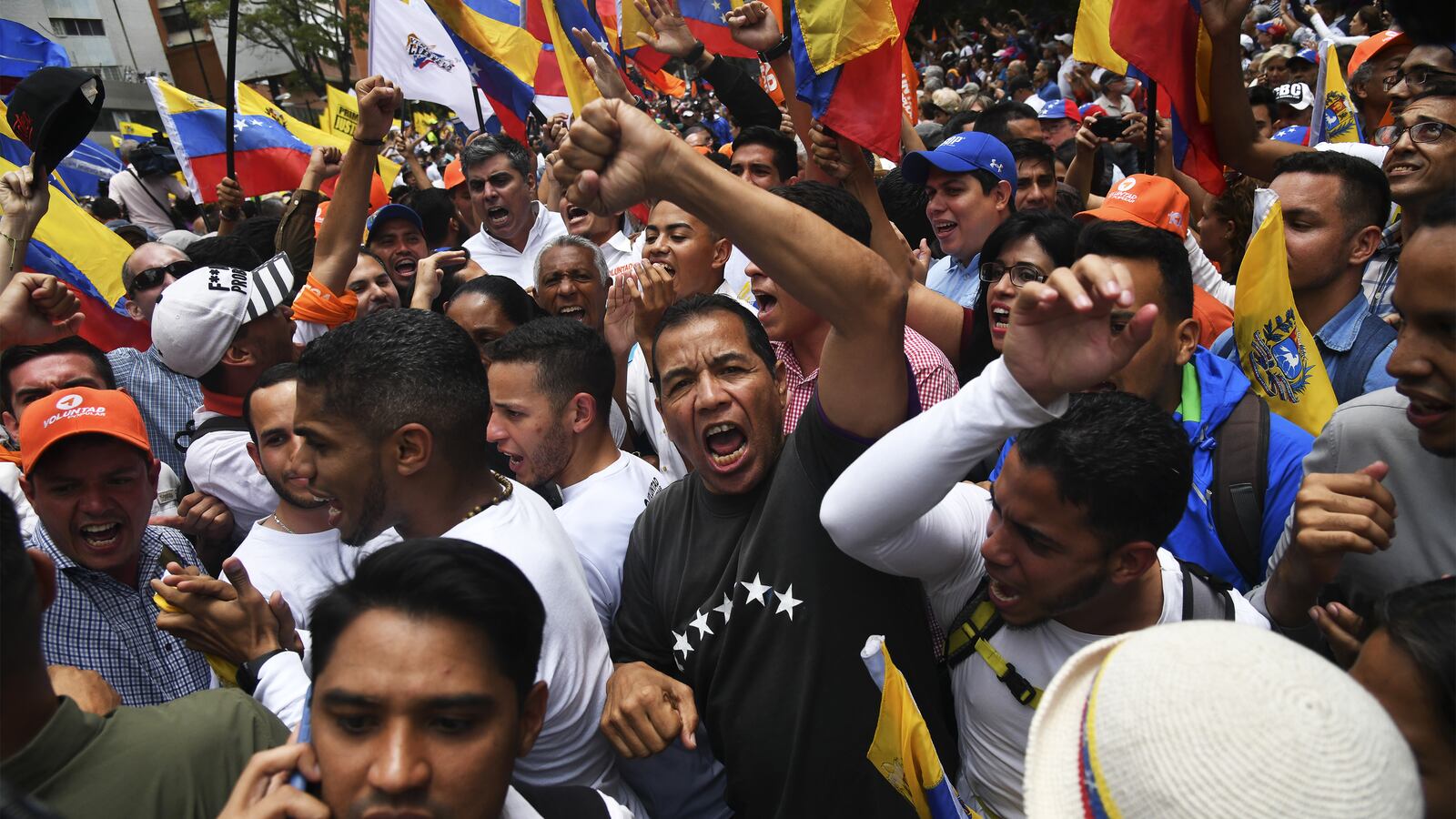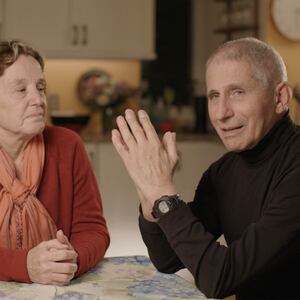A La Calle’s translated title is “To the Streets,” and Maxx Caicedo and Nelson G. Navarrete’s documentary lives up to that billing, providing numerous ground-level views of the mass protests against Venezuelan President Nicolás Maduro that have raged in recent years. Those sights begin with its opening scene, in which demonstrators decry the fact that their peaceful demonstration will shortly be repressed by the government, who’ll then blame the violence on the protesters themselves—a proclamation that’s interrupted by an explosion of gunfire that sends everyone, including the cameraman, fleeing for safety.
The fragility of democracy is the prime focus of HBO Max’s A La Calle (Sept. 15), which addresses the sad state of affairs plaguing Venezuela, a country ruled by a so-called “socialist” dictator who refuses to acknowledge his anti-democratic nature. In a country with considerable oil wealth, Venezuelans are in the grip of a political, economic and humanitarian crisis like few in modern history. As Harvard University Growth Lab director professor Ricardo Hausmann explains, whereas GDP fell 29.8 percent in the United States during the Great Depression, Venezuela’s GDP has plummeted an astonishing 45 percent, and its descent is showing no signs of slowing. The result is widespread shortages of food, electricity, clean water, and basic goods and services, which in turn has compelled many—such as sanitation worker/barber Randal Blanco, a married father of one—to turn to bartering for necessities, and ultimately to abandon his clan and flee his homeland in search of a way to survive.
Caicedo and Navarrete shot A La Calle over the course of three years, during which time they secretly interviewed a range of prominent activists dedicated to transforming the nation back into a democracy, from opposition leader Leopoldo López and grassroots activist Nixon Leal, to former National Assembly president Juan Guaidó, whose 2019 bid to oust Maduro failed. Such voices lend an immediacy to the non-fiction film, as well as allow it to articulate the pro-freedom principles upon which their movement is built. At the same time, the directors also gain considerable insight from conversations with Hausmann and Human Rights Watch’s Tamara Taraciuk, who describe the depths and depravity of the Maduro regime’s conduct toward opposition forces, which between April-July 2017 alone led to thousands of protester injuries, more than 124 deaths, and 5,400-plus arrests, with many detainees enduring torture and other human rights violations.
Though a slightly more conventional chronological structure might have supplied welcome contextualization for its recent-history material, A La Calle does detail the 1999-2013 presidency of Hugo Chávez, whose financially reckless reign paved the way for Venezuela’s dire current predicament. Compounding matters further, of course, is Maduro’s illegitimate presidency. Protests against his handling of the economy sprang to life in 2014, and though Maduro had opposition leader López arrested and imprisoned for inciting violence (a charge he denies in Skype interviews with the directors, as well as to his supporters), the president couldn’t stop the groundswell of support for his expulsion, as proven by 2015 elections in which the opposition won two-thirds of the majority, thus putting them in control of the National Assembly. In response, Maduro simply changed the rules before any transition of power could take place, installing loyalists in the Supreme Court who promptly neutered the standing of the National Assembly and granted him what amounts to total dictatorial control.
A La Calle is the story of a particular instance of democracy being overthrown in favor of autocracy, but it knows that Maduro’s saga follows a template that’s been seen around the world, as illustrated by a canny news-segment montage that references, among others, Hong Kong, Poland, Russia, and the United States. In Maduro’s destruction of his political system’s checks and balances, his altering of election laws, and his criminalization and demonization of opponents (be it rival politicians or the press), it’s easy to see parallels between his conduct and that of former American President Donald Trump. Left unmentioned is COVID-19, but Maduro’s refusal to acknowledge the growing catastrophe unfolding in his country—which therefore allows him to take no action to fix it, and in fact to block international aid shipments trying to cross into Venezuela—is also reminiscent of Trump and his handling of the pandemic.
While Caicedo and Navarrete lucidly expose the big picture, it’s A La Calle’s focus on individual tales of hardship and rebellion that lends it true weight. A scene of a working-class man submerging himself in sewage in search of food says just about everything one needs to know about the scale of this calamity and the desperation it’s wrought. Chats with Leal and López hammer home the personal and familial cost of standing up to injustice, with the former eventually serving part of his sentence under house arrest (which makes his clan’s life a nightmare), and the latter arrested, vilified on national television by Vice President Tareck El Aissami, and brutally tortured (which Caicedo and Navarrete dramatize via animation). In their and others’ accounts, the film captures the arduous struggle to resist, and persevere, amidst great danger and need. And in up-close-and-personal footage of throngs taking to the streets to demand change, it functions as a tribute to engaged, enraged protest.
Hope ultimately arrives in the form of Juan Guaidó, a former López compatriot who’s seen physically confronting security forces during marches, and bloodily recovering from rubber-bullet gunshots. By 2019, Guaidó was proclaiming himself the National Assembly-backed interim president of Venezuela, determined to bring about free elections and, in the process, Maduro’s departure. Those dreams, unfortunately, didn’t come to pass, thereby confirming the difficulty of defeating an autocrat once he or she is firmly ensconced in the corridors of power. For further evidence of that, one need only listen to the many pro-Maduro men and women that Caicedo and Navarrete also include in A La Calle—individuals whose continued allegiance to their president, even in the face of poverty and misery that his administration has created and amplified, is a reminder that the battle against autocracy takes place not only in palaces and parliaments, but in the larger public sphere.






